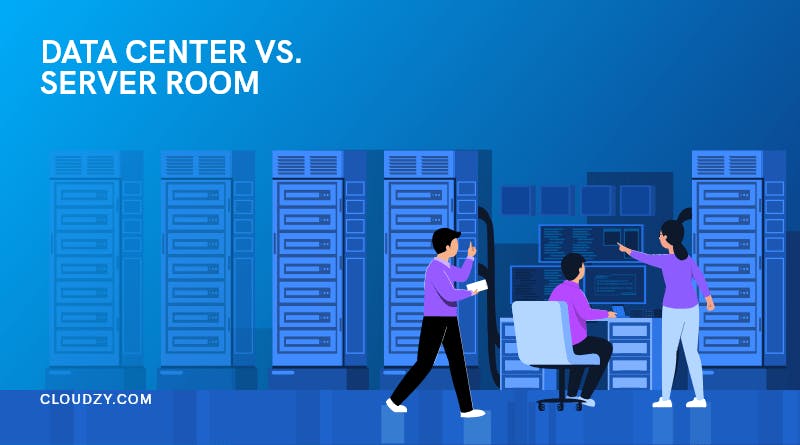Data Center vs. Server Room: Key Differences, Benefits, and Risks
 The Main Difference Between Data Center & Server Room
Before getting into the data center vs. server room technical differences, here’s a simple explanation to get a general idea of what they actually are.
The Main Difference Between Data Center & Server Room
Before getting into the data center vs. server room technical differences, here’s a simple explanation to get a general idea of what they actually are.
Imagine an entire building that is wholly used to store and support a large amount of server hardware and networking equipment; that’s called a data center. On the other hand, a server room is a specific area or room for this exact purpose but is located on your premise.
The good news is that both of these options allow you to control your business’s data and infrastructure. But one important factor can tip the scales in favor of the data center; running on multiple nodes with externalized data stores.
Datacenter vs. Server Room: General Advantages & Disadvantages
data center vs. server room pros and cons list vary based on each business’s needs. Still, once you know each option’s general advantages and disadvantages, the choice will be much easier.
On-premise Server Rooms Advantages
The best and most important advantage of having an onsite server room is that you own it 100%. However, this ownership comes with a price; 100% of the responsibility falls on you too. Having your server room at your premise gives you the ease of mind that you can access it at any time. You will be able to modify and manage your facilities based on your business’s needs throughout the year. Another benefit of having a server room is the security. You will have complete control over your system, which is a huge reassurance, especially with the rising risks of cyberattacks.
On-premise Server Rooms Disadvantages
Having complete control over your data means that your team’s workload will be pretty high. Challenges come when you are not expecting them, and your team should be able to handle them efficiently. Imagine that there’s a problem with the physical infrastructure of your business, and your team is busy maintaining the health of the servers. As a result, they will have no time to tend to initiatives that directly impact your business. Another crucial error in having a server room is that backups are less effective. Also, your data is at risk should an emergency such as a fire, flood, or theft occur. Let’s say you are doing well and want to expand your business to new locations; having a local server makes this quite hard. All your data is stored onsite and once you open your new branches, you need to develop a practical solution for everyone to connect to headquarters easily. And as you already know, choosing a data center location is crucial when it comes to your business’s success which will be discussed in the following sections. And now the question lingering in the back of your mind is, what about the up-front costs? Up-front costs can be predictable if you know what kind of server you need, but most on-premise servers are pretty expensive.
Data Centers Advantages
Data centers are the best option for business owners who are just starting out because they won’t have to worry about the financial burden of infrastructure and maintenance of onsite servers. Even if you have a big budget, it’s wise to reduce your costs whenever possible. You will not be in charge of maintenance responsibilities which means you can focus on improving your business or expanding ahead of time. data centers have extra backup systems for network access, electricity, and climate control. Many data centers have backup power generators. So you won’t have to worry about local power utility outages.
Data Centers Disadvantages
In the case of up-front costs, choosing a data center can be expensive, especially if you choose a colocation one. Setup fees for hardware and software are high. You would have to rely on the data center for maintenance, security, and uptime.